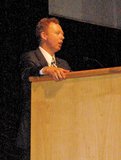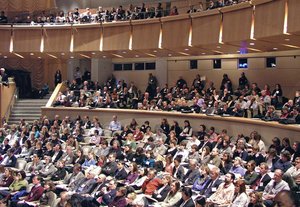Climate, Poverty and Health: Opening remarks
Series: The John H. Chafee Memorial Lecture on Science and the Environment
7th National Conference on Science, Policy and the Environment
Date: February 1, 2007
Location: Ronald Reagan Building and International Trade Center, Washington, DC
Richard Benedick: Ladies and gentlemen, a traditional high point of the annual national conference is the John H. Chafee Memorial Lecture. The list of past Chafee lecturers speaks for itself: Nobel Laureates Sherwood Rowland and Mario Molina; Pulitzer Prize recipients E.O. Wilson and Jared Diamond; Rita Colwell, then Director of the National Science Foundation and now a member of the NCSE board; Bill Ruckelshaus, who was the first administrator of the Environmental Protection Agency and also the fifth; and last year, Ralph Cicerone, President of the National Academy of Sciences. This year, we have another, dare I say, brilliant addition to this list. I’m sure it is the first time you have heard that. I would like to call on to introduce our Chafee lecturer, Peter Saundry, the indefatigable Executive Director of the National Council who is the real motor behind our daily work and our daily and annual accomplishments. It is my pleasure to turn to Peter Saundry.
Peter Saundry: I’ll be brief, because I know you all are eager to hear what Larry has to say, so let me just tell you a little bit about him.
Preparing this introduction was actually kind of fun, because it was a little bit like reading a movie script. The movie that comes to mind—I hope you will not get offended by this Larry—is Forrest Gump. Not that he has any similarity to Tom Hanks’ character, but Larry has this sort of innate ability to be around at iconic moments at just the right time.
Take a look at his background. When Larry’s father suffered from cancer, he went into medicine. And just as he was getting ready to start a rather traditional career as a surgeon, a group of Native Americans occupied Alcatraz Island.
I’m not quite sure how, but Larry was recruited into going to the island to help deliver a baby and ended up becoming a spokesman for Native American rights, which led him into a movie part playing a hippie doctor, which may be appropriate. Which got him nothing but a ticket to and a spell on an ashram in North India where he picked up a very useful skill: He speaks Hindi. And I know from this afternoon’s conversation, he is still fluent in it. But he had, I think, a very practical guru who sent him down to work for the United Nations on smallpox eradication just at the time when Indira Gandhi was opening up India to that process. He says he was just a mascot for the program, but after a time, Larry and his team from the World Health Organization succeeded in eradicating smallpox from India, and from the world.
When he returned to the United States, he picked up a Masters in Public Health, served a stint as a professor at the University of Michigan, and established the Seva Foundation, which has essentially cured blindness for two million people in Asia through surgery and a number of other procedures.
He tried to recruit a young computer whiz to give up what he thought was a foolish company at the time to come and run Seva. Fortunately, perhaps, Steve Jobs told him no and went on to change the world with Apple Computer. But it seems Jobs probably taught Larry a few things about IT, because Larry started to set up IT companies and he has done extremely well in that, forming, well, the WELL. I do not know if you remember WELL. It is still around, I think, as the Whole Earth ‘Lectronic Link, sort of an online community, one of the first and perhaps one of the longest lasting. He then went on to form a number of other companies, such as SoftNet.
On the side, he managed to keep his hippie roots, I guess, by holding—from what I understand—sort of a parttime role as doctor to the Grateful Dead. I’m sure there are a lot of Deadheads who probably would treat him very well. And having done all these wonderful things, he finally, in what I think is an iconic moment for our generation and for the modern world, became head of Google.org.
Now, finally onto Google.org. The mission, as I can see it, seems to be “do good,” which is not a bad mission. They are focusing on climate change (Climate Change (collection)), global public health, and global poverty. I know from our conversations this afternoon that Larry thinks big, and we can expect very big things out of that enterprise going forward. There is a line in the Bhagavad Gita which seems to have a lot of special resonance for Larry and I think it has a lot of resonance here today; and that is, “Live your life without ambition, but live as those who are ambitious.” It seems somewhat contradictory. It really is about how you strive for ambitious goals because those ambitious goals are worth undertaking—not because you yourself are important or because you want to be famous, I think, but because of the goal itself. And that seems to be, to my mind, very resonant with why we are here today.
I think most of you spent the afternoon putting out ideas that are extremely ambitious, ideas that we hope can change the world for the better. It is not that one idea is a magic silver bullet, but these ideas collectively can begin to turn this supertanker of a world slowly, slowly, slowly but continuously in the right direction towards a better world. We have just heard two examples of how two people, NCSE Lifetime Achievement Award recipients Theo Colburn and Herbert Needleman, have really made profound contributions to doing that. They are an inspiration to us all. So, it seems appropriate that we should then think of that mantra. Which is, I think, appropriate to think about here in this town—because here, the highest hopes of mankind work hand in hand with the deepest cynicism of man.
Reality makes us very cynical. For those of us who watch politics, you stay around long enough and you can get very, very cynical. And if you look around at the things that are going on around the world it is easy to get very, very depressed. And yet, we can, I think, constantly inspire ourselves to get up in the morning and struggle to do something worthwhile. And that is what Larry Brilliant’s career has been about, and that is what he is endeavoring to do. I think for the next hour, he is going to illuminate us on that very subject. So Larry, thank you very much for coming.
|
|


